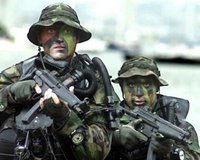Danny Williams and the companies looking to bring the Hebron-Ben Nevis field into production set April 1 as the deadline to achieve an agreement on royalties and local benefits.
There's been dead silence on the talks in the past few weeks. Yes, the Premier met with senior company officials in Toronto and other meetings have taken place, but so far not a word about the negotiations have hit the streets.
In the long run that may be good news.
Almost a year ago, Danny Williams was excited to learn that the companies involved in developing the Hebron-Ben Nevis offshore Newfoundland had reached an operating agreement and would be coming to the province to talk about getting the field in production.
It's useful to go back and look at what Danny
wanted when the talks started. He told reporters last April that it was important to "grow" the oil industry in Newfoundland and Labrador. Williams was looking for a favourable royalty regime, secondary processing and improved research and development spending.
In the meantime, Williams recently redefined his "ask", to use the sales term he favours. He indicated the province was looking for better royalties than on other projects, improved local industrial benefits, and an "equity position".
Piling on the demands made many in the local industry nervous, but as Williams told reporters in a scrum last year that he expects detailed, frank negotiations in which the province got a reasonable, fair return. Williams has talked recently about an equity position, but as the companies made clear they weren't prepared to entertain a deal that gave the province a management stake in Hebron.
Williams likes to add on demands in public and talk tough, but his pattern in bargaining has usually been to settle for something much less than his last "ask" all the while claiming total victory.
Chevron and the partners are deadly serious about closing up their Hebron shop if this set of negotiations fails. They can still gain financial benefit from having undeveloped Hebron as part of their portfolio. Once Williams is gone they can look to strike a good deal later in a post-Williams Newfoundland and Labrador.
By contrast, Williams and his administration can't afford to say no to what, by most accounts would be an excellent development deal. He needs a new confirmed win in the wake of the Fishery Products and Abitibi disasters. Williams can't afford to let the local oil industry shrink having committed himself to continued economic growth in the province.
More to the point though, Williams needs the cash that will flow from development heading into the next election, likely his last. Money from Hebron can be used by Newfoundland and Labrador Hydro to help develop Williams' glory piece, Lower Churchill development, as a "go-it-alone' project.
Without Hebron cash, Williams will be forced to take the Ontario and Quebec proposal. That circumstance would demolish the carefully built facade of the resurgent and vibrant Newfoundland and Labrador which thrives under his leadership and which can tackle any project by itself, of course with Danny in charge. The illusive and sometimes illusory Lower Churchill project would become, in Danny's view, the antidote to the supposed failure of the Upper Churchill development if it is built with as little outside help as possible. With that project under his belt and with a clean sweep of the provincial legislature's seats in late 2007, Williams will head off to his next goal. Maybe Ottawa has been singing the same siren call to Williams it has sung to at least one other premier.
Williams' political colleagues need the Hebron production cash to start flowing when one of
them heads to the polls in 2011. That will be the time when offshore oil revenues are expected to decline from their current peak. Their internal pressure will be a powerful force behind signing a good deal of the type Chevron and the other companies are already prepared to accept.
That's why
Bond Papers expects an announcement very shortly on a Hebron deal. There will be added industrial benefits of some kind and a better financial return for the province. The added cash may be called "equity" but there will be no management control explicit or implicit in that, no matter what the Premier's Office tries to present.
Expect solid local benefits which will ensure the local service and supply sector, represented by
NOIA, is happy and continues to grow.
We can also expect a massive signing ceremony in which the deal and its signatories will be lauded as never before.
That's the Danny way.
Step 1: Ask for a trip to the moon and the stars.
Step 2: Add a trip to a distant galaxy.
Step 3: Settle for less.
Step 4: Claim victory.
Step 5: Praise all highly and lavishly.
The atmospherics are irrelevent; what matters is that a good deal gets done.
A deal will be good for the oil companies. It will be good for the local supply sector. The cash revenue will be good for the people of the province.
And Danny and his political colleagues will have a solid political win to use for their own purposes.
No deal is not really a viable option.
 Left: Signing of the Terms of Union between Canada and Newfoundland, 11 December 1948.
Left: Signing of the Terms of Union between Canada and Newfoundland, 11 December 1948.













